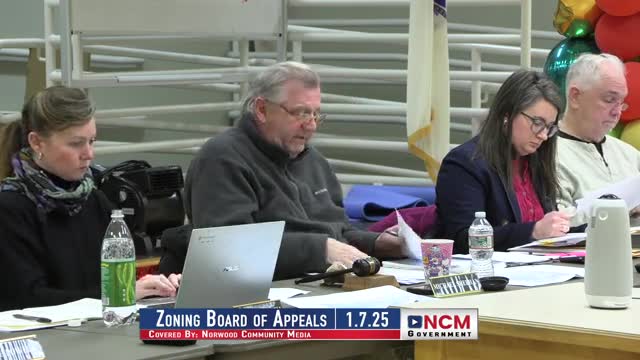Norwood zoning board approves amended permit for adult-use cannabis operation on Astor Avenue with police review conditions
Get AI-powered insights, summaries, and transcripts
Subscribe
Summary
The Norwood Zoning Board of Appeals approved an amendment to allow an adult-use marijuana operation at Astor Avenue, imposing conditions requiring Norwood Police review of delivery and fake-ID procedures and return to the board for certain Host Community Agreement changes.
The Norwood Zoning Board of Appeals approved an amended special-permit application to allow an adult-use marijuana operation at a property on Astor Avenue, voting to grant the application with conditions that require Norwood Police review of delivery and false-identification procedures and return to the board if the Host Community Agreement is materially changed.
The vote followed a public hearing at which counsel for the applicant, Philip Silverman of Vicente LLP, and the court-appointed receiver for the company described safety, delivery and ownership safeguards the project would adopt. The board approved the motion after discussion and public comment.
Silverman told the board the applicant had supplied a traffic study and that the study’s conclusion was that the development would have “minimal impact” — he read a line aloud, saying, “1 additional trip is what it said.” He said the company would not allow deliveries into Norwood and requested permission only to make deliveries outside town limits, using third-party delivery contractors: “We are not that type of company. So we would engage a third party to do those deliveries again outside of Norwood.”
Silverman also said the applicant will include procedures to detect and report false identification in its safety-and-security plan and will provide copies of any suspected false IDs “to the Norwood Police Department.” He said the safety-and-security plan will be submitted to the police chief for review.
During deliberations the board discussed buffers and state rules. Silverman explained that under state law the only statutory buffer is 500 feet from K–12 schools; previous medical-marijuana rules that referenced daycare and “places where children generally congregate” have been repealed. Town counsel and proponent counsel agreed the Host Community Agreement (HCA) with the select board had already been approved at the local level.
The board attached three conditions to the approval: that (1) any delivery within Norwood requires specific approval from the Norwood Police Chief, (2) the applicant present a written plan for handling suspected false identification for review and approval by the Norwood Police Chief, and (3) any material changes to the Host Community Agreement that affect the special permit must be returned to the Zoning Board for review. The motion was moved by a board member and seconded; the record shows one member voted against the motion and the remaining members voted in favor, producing an approving majority.
Applicant counsel noted additional nonlocal approvals remain: transfers out of receivership and any change of ownership will require judicial approval, background checks and interviews by the Massachusetts Cannabis Control Commission and further notice to the select board. As Silverman summarized the post-approval process: the receiver and any prospective transferee “have to get that approved by the judge. We have to get that approved by the Cannabis Control Commission.”
During the public comment period a local resident, Carolyn Barrows of Napasa Street, asked whether the business would operate as a nonprofit and whether that would affect tax revenue; Silverman replied it would not affect the town’s tax revenue. Several board members reiterated that police-review conditions were intended to reduce risks associated with deliveries and suspect identification.
The approved conditions put the Norwood Police Department in a gatekeeping role for deliveries into town and for final sign-off on the applicant’s false-ID procedures; the applicant must also notify the Zoning Board if the Host Community Agreement is materially changed so the board can consider whether the special permit remains appropriate under any amended terms.
Next steps identified in the hearing record are administrative: the applicant must submit the safety-and-security plan and false-identification procedures to the police chief for review, and the board will require notice should the HCA change in ways that affect the permit.
